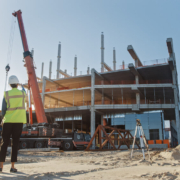I Am Looking to Buy a Commercial Building – What Type of Due Diligence Should I Do?
The purchase of a commercial property can involve a high degree of risk, particularly if you don’t find out as much as possible before closing the deal. While there are some protections in place for purchasers of residential properties, it is assumed that the parties involved in commercial real estate transactions are more sophisticated.
The old adage of “buyer beware” applies strongly to commercial real estate purchases. Traditional rulings of the courts indicate that the buyer will be stuck with whatever they purchased with limited recourse. Because this is a likely result, extra caution makes sense in these transactions with a thorough due diligence process.
What is Due Diligence?
Due diligence for commercial real estate represents a meticulous and systematic investigation into every single aspect of a transaction prior to its closing. For the buyer, this process is an indispensable tool, enabling a deep dive into the background of the seller, the intricate details of the property, and the multifaceted financial dynamics of the proposed deal. Its fundamental purpose is to unearth any potential issues, liabilities, or discrepancies that might otherwise remain hidden, thus preventing costly and undesirable surprises from emerging post-transaction. It is, in essence, a rigorous risk assessment undertaken to validate the assumptions and representations made by the seller.
The scope and intensity of your due diligence efforts are not static; they are highly contingent upon the nature of the transaction and, crucially, your overarching objectives as the buyer. A stark example illustrates this point: a buyer intending to purchase a raw land parcel for future commercial development will prioritize investigations into zoning, environmental impact, utility access, and soil conditions. Their needs diverge significantly from an individual acquiring an existing office building to operate their own business, who might focus more on the building’s structural integrity, functionality, and immediate operational costs. Similarly, an investor whose sole aim is to acquire a multi-tenant property to generate passive rental income will place heavy emphasis on reviewing leases, tenant creditworthiness, historical financial performance, and market rent trends. Establishing these specific goals at the outset is not merely helpful; it is foundational to designing an effective and targeted due diligence framework.
Once your intended use for the property and your investment goals have been clearly defined, you can then proceed to construct a robust framework for your due diligence process. While the precise checklist may vary, the comprehensive investigation typically segments into three broad, yet interconnected, categories: physical due diligence, legal due diligence, and financial due diligence. Each category addresses a distinct domain of risk and information, collectively providing a holistic view of the asset.
Physical Due Diligence
As the name explicitly suggests, physical due diligence centers on verifying the tangible aspects of the property—the building structure, the underlying land, and all other physical attributes—to ensure they align precisely with the representations provided by the seller. This phase aims to uncover any material defects, deferred maintenance, or significant capital expenditures that may be required in the near future. Lenders, as well as prudent buyers, universally mandate certain standard third-party reports that unveil a wealth of critical information. These commonly include a comprehensive appraisal, a detailed analysis of zoning compliance, exhaustive building/engineering reports, a thorough environmental investigation, and a precise land survey.
- Appraisal: While primarily aimed at determining the market value of the property for lending purposes, the appraisal report often highlights key characteristics that impact value, such as comparable sales, property condition, and area trends. It provides an independent valuation perspective that can either confirm or challenge the proposed purchase price.
- Zoning Compliance: Relying solely on the seller’s assertion that a property is in compliance with local zoning ordinances is a perilous mistake. If your plans involve any alteration to the existing structure, a change in use, or new construction, it is absolutely vital that you independently research the site’s current zoning classification and permitted uses. Furthermore, you must investigate the specific requirements and processes for obtaining any necessary variances, conditional use permits, or rezonings from the local planning and zoning department. Non-compliance can lead to significant delays, hefty fines, or even the inability to utilize the property as intended. This also involves checking for any special overlays (e.g., historic districts, flood plains) or development moratoria that could impact future plans.
- Building/Engineering Reports: This is arguably the most critical component of physical due diligence. Analogous to a home inspection report for a residential property, a comprehensive building or engineering report provides an in-depth, expert assessment of the property’s core systems and structural integrity. This includes a meticulous examination of the electrical systems, heating, ventilation, and air conditioning (HVAC) systems, plumbing, roof, foundation, exterior envelope, and any other vital building components. The inspecting engineer will meticulously document existing defects, maintenance deficiencies, structural concerns, and identify elements nearing the end of their useful life, which will translate into future capital expenditures. This report may also include an assessment of ADA (Americans with Disabilities Act) compliance, fire and life safety systems, and vertical transportation (elevators). For specialized properties, a specific assessment of heavy machinery, specialized plumbing, or industrial electrical systems might be required.
- Environmental Investigation (Phase I & II): Most commercial lenders, and indeed all cautious buyers, require a minimum of a Phase I Environmental Site Assessment (ESA). This initial report is a non-invasive review of historical property uses, aerial photographs, regulatory databases, and a site reconnaissance to identify potential environmental concerns or “recognized environmental conditions” (RECs). The findings of the Phase I report are crucial; if RECs are identified (e.g., evidence of past industrial activity, underground storage tanks, proximity to a Superfund site), it will trigger a recommendation for a more intrusive Phase II ESA. A Phase II involves actual sampling and testing of soil, groundwater, and sometimes building materials to quantify the presence and extent of hazardous substances like asbestos, lead-based paint, petroleum hydrocarbons, or mold. Unaddressed environmental contamination can lead to enormous remediation costs and significant legal liabilities, making this a paramount aspect of due diligence.
- Land Survey: A current ALTA (American Land Title Association) survey is essential. It graphically depicts the exact boundaries of the property, identifies all existing easements (e.g., utility easements, access easements), encroachments (structures crossing property lines), and the location of improvements on the land. It also verifies legal access to public roads and highlights any set-back requirements. The survey ensures that the buyer is acquiring the exact parcel of land as understood and reveals any title issues related to boundaries or access.
- Utilities: A thorough investigation should also include verifying the availability, capacity, and cost of essential utilities such as water, sewer, electricity, natural gas, and telecommunications (internet, fiber optics). Ensuring adequate infrastructure exists for your intended use is vital, particularly for development projects.
Legal Due Diligence
Legal due diligence is another indispensable aspect of the overall investigation, focusing on the legal standing of the property, the seller’s rights to convey it, and any legal impediments or obligations tied to the asset. This phase ensures that the buyer acquires clear and marketable titles and understands all contractual commitments.
- Title Examination: Working in close collaboration with a reputable title company is fundamental to this process. The title company conducts an exhaustive search of public records to trace the chain of ownership and identify any encumbrances on the property. This culminates in the issuance of a commitment to issue a title insurance policy. This commitment is a critical document, outlining all conditions, exceptions, and requirements that must be met before a clear title can be conveyed at closing. It will reveal any existing liens (e.g., mortgages, tax liens, mechanic’s liens), easements, restrictive covenants (conditions imposed by previous owners), judgments, bankruptcies affecting the title, or municipal code violations that could cloud the title or impose future obligations. Discovering these impediments sooner rather than later is paramount, as they often require resolution before closing. Title insurance then protects the buyer against future claims arising from defects in the title that were not discovered during the search.
- Lease Review (for income-generating properties): For any commercial property with existing tenants, a meticulous review of all leases is non-negotiable. This involves scrutinizing rent rolls to verify current income, examining lease terms (start/end dates, renewal options, termination clauses), understanding rent escalation clauses, and analyzing common area maintenance (CAM) charges, operating expense pass-throughs, and real estate tax responsibilities. Other vital considerations include tenant improvement allowances, exclusive use clauses, co-tenancy provisions, default clauses, and any personal guarantees from tenants. The financial stability and operational history of major tenants should also be assessed. This review confirms the income stream and helps project future revenue and expenses.
- Contracts and Agreements: Beyond leases, a buyer must review all other contracts and agreements affecting the property. This can include service contracts (e.g., landscaping, cleaning, security, elevator maintenance), property management agreements, brokerage agreements, and any reciprocal easement agreements (REAs) that govern shared facilities or access with adjacent properties. Understanding these ongoing obligations is crucial for accurate financial forecasting.
- Permits and Certificates: Verification of all necessary permits and certificates of occupancy issued by local authorities is vital. This ensures the building’s current use is legal and that it complies with all relevant building codes, fire codes, and safety regulations. Any open permits or violations must be addressed.
- Litigation and Legal History: Investigate any past, pending, or threatened litigation involving the property or the seller that could impact the asset’s value or transferability. This might include disputes with tenants, contractors, or regulatory bodies.
- Organizational Documents: If the seller (or buyer) is an entity (e.g., corporation, LLC, partnership), a review of their organizational documents (e.g., articles of incorporation/organization, bylaws, operating agreements) is necessary to confirm the authority of the individuals executing the transaction.
Financial Due Diligence
Perhaps one of the most critical and often complex aspects of commercial real estate due diligence is the financial element. The fundamental premise for purchasing commercial property is typically investment and profit generation, making a thorough financial assessment indispensable. Buyers must have every assurance that the acquisition represents a sound investment and meets their financial objectives.
- Net Operating Income (NOI) Analysis: As a buyer, you must obtain and meticulously analyze the financial documentation detailing the property’s current and historical net operating income (NOI). This requires reviewing at least three years of financial data, including income statements, expense ledgers, and rent rolls. You’ll want to break down the gross potential income (GPI), account for vacancy and collection losses, and then itemize all operating expenses. These expenses typically include property taxes, property insurance, utilities (water, sewer, electricity, gas), repairs and maintenance, management fees, cleaning, security, and administrative costs. Analyzing this historical data allows you to identify trends, seasonal variations, and any unusual spikes or dips in income or expenses, providing a realistic picture of the property’s operational efficiency.
- Historical Financial Data Validation: The emphasis on obtaining at least three years of financial data is to establish a robust baseline. This historical perspective allows you to identify consistent income and expense patterns, reveal any anomalies (e.g., a one-time major repair that skews expenses for a single year), and understand the property’s performance through different market conditions or economic cycles. Without this historical context, projections for future performance are merely speculative.
- Seller’s Tax Returns: A prudent buyer should absolutely insist on examining the tax returns of the individual or entity that currently owns the property (the seller). These tax returns serve as an independent verification of the reported financials, such as income and expenses. If the figures on the tax returns diverge significantly from the property’s operating statements, this could be a major red flag, indicating potential misrepresentation or dishonest reporting. While sellers might attempt to minimize taxable income, this exercise helps confirm the veracity of the numbers presented in their pro forma statements.
- Pro Forma Analysis and Future Projections: While historical records are vital for understanding past performance, it is equally important to conduct a detailed pro forma analysis that projects the property’s future financial results, especially considering any changes you plan to make. This involves forecasting future income (e.g., anticipated rent increases, the lease-up of vacant space, additional revenue streams) and future expenses (e.g., projected increases in operating costs, anticipated capital expenditures for roof replacement, HVAC upgrades, or significant renovations). How will these planned changes—whether they be renovations, a change in tenant mix, or a shift in operational strategy—impact the property’s income and expense structure, and ultimately, its profitability? This forward-looking analysis allows you to model various scenarios and assess the potential return on your investment.
- Tenant Creditworthiness: For income-producing properties, assessing the financial health and stability of existing major tenants is crucial. A financially weak tenant, or one with a history of late payments, poses a significant risk to future income streams. This might involve reviewing their financial statements, credit reports, or business history, particularly for single-tenant properties or those with a few dominant tenants.
- Market Analysis: Although not strictly “financial” in the property’s direct financials, understanding the broader market context is critical for financial due diligence. This includes researching current market rental rates for comparable properties, vacancy rates in the submarket, absorption rates, and recent comparable sales. This external data helps to validate your projected income and assess the property’s competitive position.
The Due Diligence Period and Contingencies
A critical element of the purchase agreement for commercial real estate is the “due diligence period” or “inspection period.” This is a defined timeframe, negotiated by both parties, during which the buyer has the contractual right to conduct all necessary investigations and inspections. The purchase agreement typically includes a due diligence contingency, which allows the buyer to terminate the contract and often reclaim their earnest money deposit if the findings during this period are unsatisfactory or reveal unacceptable risks. This period provides the buyer with the necessary time and legal leverage to perform all aspects of due diligence without the pressure of an immediate closing.
San Diego Due Diligence Real Estate Attorneys
Due diligence is a complex, comprehensive, and critical process in any commercial real estate transaction. As the buyer, you don’t want any stone left unturned since an omission or misrepresentation can be costly.
The experienced real estate attorneys at Garmo and Garmo, LLP provide comprehensive due diligence services for clients throughout San Diego County and Southern California. For a free consultation with one of our attorneys, call our office today at 619-441-2500 or send us a message through our web contact form.








